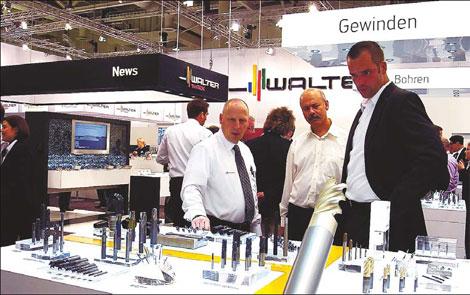
A booth of Walter AG at the EMO Hannover 2011 trade fair. According to the company, China is the world's largest machine tool producer, consumer and importer. [China Daily]
China is expected to account for about one-third of global tool demand by 2020, despite worries about a slowdown in its economic growth, German metal-cutting tool supplier Walter AG said.
"China is currently Walter's third-largest market ... (following Germany and the US). But its growth rate is the fastest, and it is only a question of time before China will be our second-biggest market," said Andreas Evertz, president of Walter.
The Tuebingen, Germany-based company, currently employs about 200 people in China and plans by the end of the year to increase the number by 50 percent and more than triple it in the near future, Evertz said.
In addition to organic growth, Walter is also interested in acquiring local companies in China, Evertz said. He added that Walter had contacted some local firms, but he declined to name them. Walter is looking at companies with high-quality products and strong sales networks around the country, he said.
Founded in 1919, Walter provides high-end tooling systems for turning, milling and drilling. It entered China in 1996 and now designs and produces special tools for customers in a factory in Wuxi, in East China's Jiangsu province.
It also owns a technology center in Wuxi where it tests products and offers training courses for customers. It plans to open three more technology centers in the next 12 to 18 months - in Beijing, Shenyang in Northeast China's Liaoning province, and Chongqing or Chengdu in Southwest China - said Per Tornell, managing director for Walter Greater China.
China is the world's largest machine tool producer, consumer and importer. The country currently accounts for 15 to 17 percent of the world's tool demand. China's metal-processing machine tool industry achieved output value of 98 billion yuan ($15.4 billion) in the first half of this year, up 32.9 percent year-on-year, according to statistics from the China Machine Tool and Tool Builders Association. The country imported machine tools valued at $9.69 billion during the same period, up 46.35 percent year-on-year.
"Industries such as aviation, automotive, shipbuilding and energy will be the focus of China's machine tool market. They are creating huge demand for high-end computer numerical control machine tools and highly efficient cutting tools," Wang Liming, executive vice-president of the association, said during the EMO Hannover 2011 in late September. The two-yearly trade fair is one of the world's leading metal-working technology trade fair.
The automobile industry has been the most important customer for the machine tool industry, contributing 30 to 40 percent of the global metal-cutting tool market.
Thanks to the explosive growth of China's automobile market, Walter's sales in China surged 80 percent year-on-year in 2010, Evertz said. China overtook the US as the world's largest vehicle market in 2009. Its automobile market saw 32 percent year-on-year growth in 2009 and 46 percent in 2010, stimulated by government efforts such as tax breaks on purchases and subsidies on trade-ins in rural areas.
But with the two-year incentive policies ending and car purchase limits enacted in some cities to protect the environment, auto sales growth in China is likely to slow to about 5 percent this year, according to the China Association of Automobile Manufacturers.
"But this is only temporary. It is still growing, from a very high level," Tornell said.
The automobile and energy industries together contribute about half of Walter's business in China, Tornell said. But the relative size of the railway and aviation sectors will increase, given the country's ambitious plans to expand the railway network and develop the aviation manufacturing industry, Tornell said.
In April, Walter opened its Asia-Pacific headquarters in Shanghai, where its engineers can reach most of the locations in the region within five hours to provide customer support. Previously, they had to fly from Germany to solve technical problems for customers in the region.





